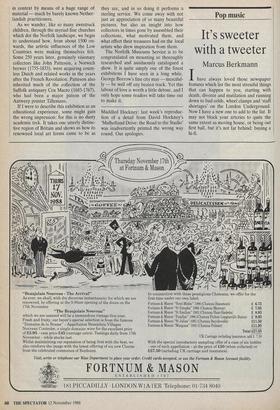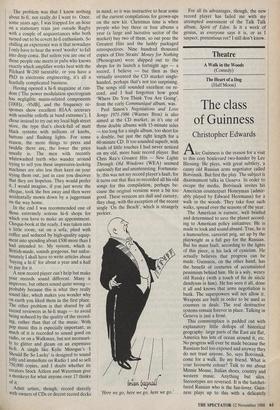Pop music
It's sweeter with a tweeter
Marcus Berkmann
Ihave always loved those newspaper features which list the most stressful things that can happen to you, starting with death, divorce and mutilation and running down to bad colds, wheel clamps and `staff shortages' on the London Underground. Now I have a new one to add to the list. It may not block your arteries to quite the same extent as moving house, or being out first ball, but it's not far behind: buying a hi-fl.
The problem was that I know nothing about hi-fi, nor really do I want to. Once, sonic years ago, I was trapped for an hour on a stationary train just outside Rugby with a couple of acquaintances who both turned out to be covert hi-fl enthusiasts. So chilling an experience was it that nowadays I only have to hear the word 'woofer' to fall into deep coma. But unless you are one of those people one meets in pubs who knows exactly which amplifier works best with the Pilchard W-260 turntable, or you have a PhD in electronic engineering, it's all a fearfully complicated business.
Having opened a hi-fl magazine at ran- dom (`The power modulation spectrogram has negligible mains-related components [100Hz, -95dB], and the frequency re- sponses show excellent RIAA accuracy with sensible rolloffs at band extremes'), I chose instead to try out my local high street store, the type that's chock-full of matt black systems with millions of knobs, buttons and flashing lights. For some reason, the more things to press and twiddle there are, the lower the price usually is. The men with recently Whitewashed teeth who wander around trying to sell you these impressive-looking machines are also less than keen on your trying them out, just in case you discover that they are hopeless. They would prefer It, I would imagine, if you just wrote the cheque, took the box away and then were accidentally mown down by a juggernaut on the way home.
In the end I was recommended one of those extremely serious hi-fi shops for Which you have to make an appointment. Cheque-book at the ready, I was taken into a little room, sat on a sofa, plied with coffee and seduced by high-quality equip- ment into spending about £500 more than I had intended to. My system, which is British-made, sounds gorgeous, but unfor- tunately I shall have to write articles about 'buying a hi-fl' for about a year and a half to pay for it.
A new record player can't help but make Your records sound different. Many it Improves, but others sound quite wrong — Probably because this is what they really sound like, which makes you wonder why on earth you liked them in the first place. The other problem is that shared by all record reviewers in hi-fl mags — to avoid being seduced by the quality of the record- ing, rather than that of the music. With Pop music this is especially important, as much of it is recorded to sound good on radio, or on a Walkman, but not necessari- ly to glitter and gleam on an expensive
A single like Kylie Minogue's Should Be So Lucky' is designed to sound Jolly and immediate on Radio I and so sell 750,000 copies, and I doubt whether its creators Stock Aitken and Waterman give a monkeys for what anyone over 17 thinks of it.
.Adult artists, though, record directly With owners of CDs or decent record decks
in mind, so it was instructive to hear some of the current compilations for grown-ups on the new kit. Christmas time is when people who buy three or four albums a year (a large and lucrative sector of the market) buy two of them, so out pour the Greatest Hits and the lushly packaged retrospectives. Nine hundred thousand copies of Dire Straits' Money for Nothing (Phonogram) were shipped out to the shops for its launch a fortnight ago — a record, I believe — but then as they virtually invented the CD market single- handed, perhaps that's not too surprising. The songs still sounded excellent on re- cord, and I had forgotten how good 'Where Do You Think You Are Going', from the early Communique album, was.
Paul Simon's Negotiations and Love Songs 1971-1986 (Warner Bros) is also aimed at the CD market, as it's one of those double albums with 15-minute sides — too long for a single album, too short for a double, but just the right length for a 60-minute CD. It too sounded superb, with loads of little touches I had never noticed on my old, more basic record player. But Chris Rea's Greatest Hits — New Lights Through Old Windows (VVEA) seemed curiously flat and uninteresting. Fortunate- ly, this was not my record player's fault, for it turns out that Rea re-recorded all his old songs for this compilation, perhaps be- cause the original versions were a bit too good. These versions are dull and cursory; they chug, with the exception of the recent single 'On the Beach', which is strangely perkier.
'Here we go, here we go, here we go.' For all its advantages, though, the new record player has failed me with my attempted assessment of the Talk Talk album, Spirit of Eden. Is it a work of genius, as everyone says it is, or as I suspect, pretentious rot? I still don't know.











































































 Previous page
Previous page